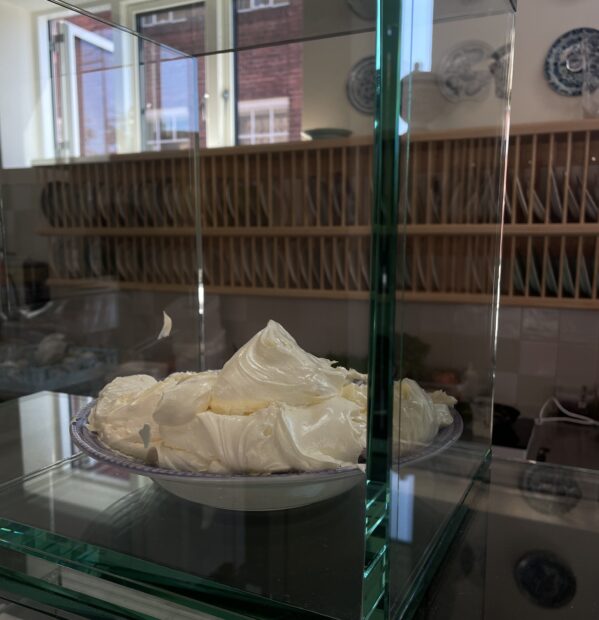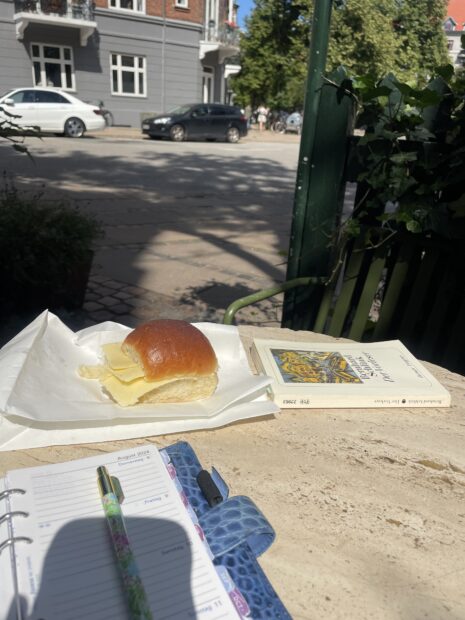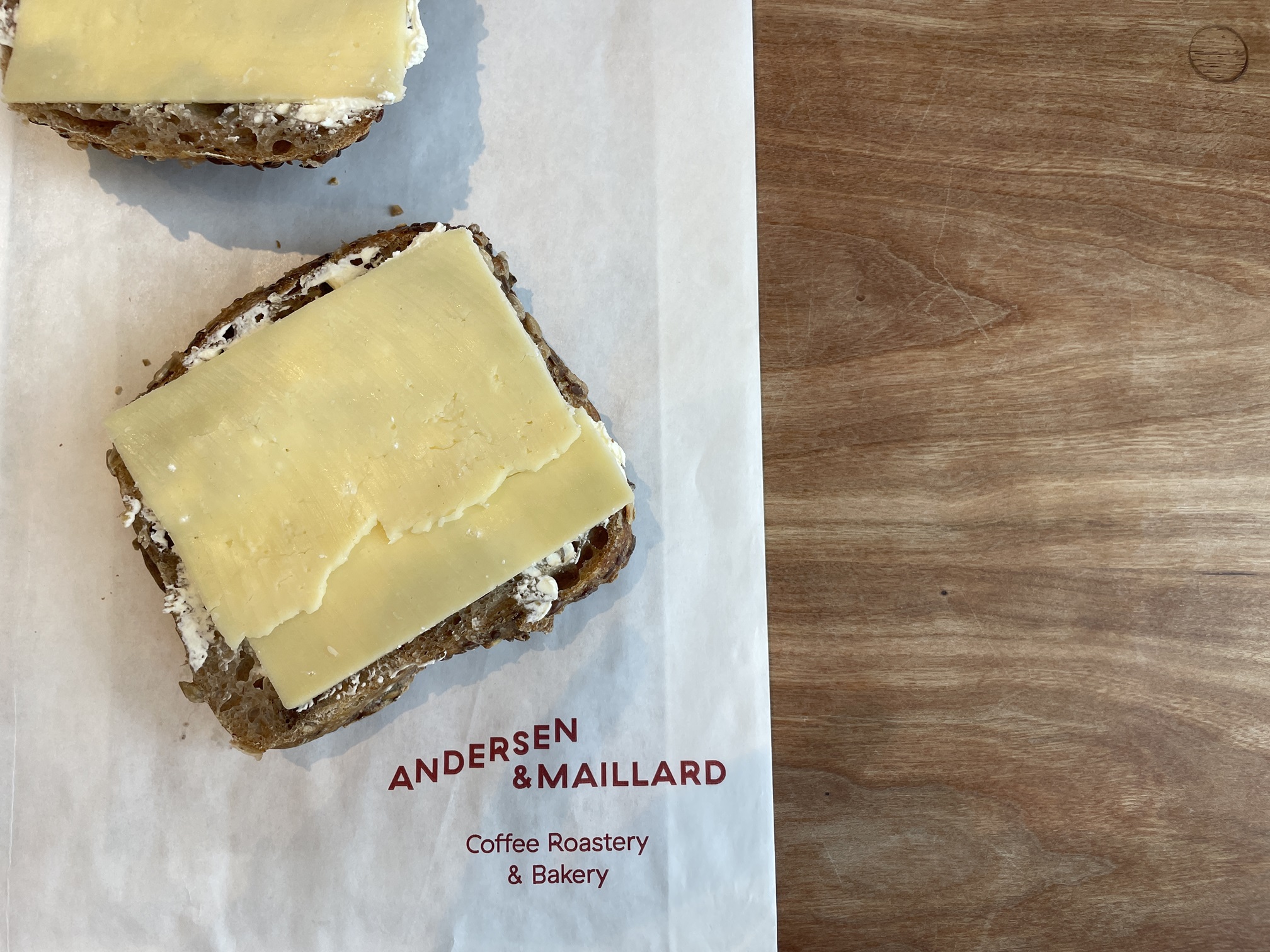Around 20 people are queuing outside the bakery Apotek57 on Fredericiagade. Most of them are about to order a BMO, a Bolle med Ost.
On the next street corner at Atelier September, the situation looks similar. Throned behind the glass counter is a neatly formed mountain of whipped butter. “Many customers come specifically for the aesthetics,” says Gerardo from Atelier September.
The rest come for the buttered bread. The BMO is one of the most popular items and has become a staple for both regulars and visitors: “It has become a signature item for the Copenhagen area,” says Gerardo.
Short for Bolle med Ost, which translates to bread roll with cheese, it’s technically just a simple bun with butter and cheese – a traditional Danish staple – yet it is increasingly becoming a hyped breakfast item.
And as easy as it sounds, all three ingredients have to be perfectly curated for it to convince.
Atelier September uses 24-month-aged Comté cheese and bread sourced from a local bakery. Strictly speaking, it’s no BMO if there is no bun, but you can also choose sliced bread instead of rolls in many other bakeries.
The cherry on top is the whipped butter: “The creamy texture and rich flavor complement the other ingredients,” says Gerardo.

This gives Atelier September’s cheese bread 5.4 out of 6 points – at least that’s what the Instagram page @bolle.med.ost claims. Every week, the anonymous couple who runs the account rates BMOs. They have more than 10,000 followers and have already reviewed 110 different BMOs.
The pair share photos and text on Instagram, and have a detailed table on their website where they evaluate all aspects of a BMO. The current top scoring cheese bun is from Juno the Bakery, hitting a BMO score of 5.8.
Juno uses the same cheese as Atelier September. Alongside Gammel Knas and Vesterhavsost, Comté is a particularly popular choice. But it’s all about the overall package.
The Instagram reviewers, both full-time mathematicians, take an average from five categories: “But the bun is more important than the butter”, says the husband: “It needs to be crispy, with a soft inner. And a bit sour as well.” Sourdough is usually used.
Sourdough bread was popularised in Denmark by the Copenhagen chef, baker and entrepreneur Claus Meyer – co-author of the 2004 written New Nordic Cuisine Manifesto, which calls on Scandinavian cuisine to focus on local and seasonal products.
In 2010, Meyer founded the first of his eleven Meyer’s Bageris. In Bolle med Ost’s BMO ranking, however, Meyers Bageri scores relatively poorly with only 3.4 points. The cheese choice is the main downfall. Meyer uses Danbo, which, according to the Instagram page operator, tastes like plastic.
Nevertheless, Meyer had a major influence on Copenhagen’s bakery scene. After the success of Meyer’s Bageri, many other bakeries followed, such as the chain Hart Bageri (BMO score: 3.1), Lille Bakery (BMO score: 4.1) and Andersen & Maillard. The latter, founded by Noma chef Milton Abel, has a very good score of 5.4 and uses Arla’s signature soft and salty Gammel Knas.

The founders of the bakeries show how closely fine dining and simple food are linked in Copenhagen. “The bakery scene is dazzling at the moment,” says the Instagram rater, yet only a few are ranked very high. In their scoring, they only pay attention to the quality of the BMO. The aesthetics of the cafés are described in the Instagram caption and the price is mentioned in the table.
While most BMOs cost between 30 and 40 kroner, Atelier September charges 95 kroner. According to Gerardo, the high price would reflect “the high-quality ingredients and the craftsmanship that goes into every serving.”
Juno is much cheaper at 35 kroner per BMO. However, this is also due to the simplicity of the bakery and the limited seating options outside on the terrace.
The generally comparatively low price is one reason why BMO is so trendy. Where you might pay 200 kroner per brunch in other breakfast cafés, a BMO and coffee is cheap and you can still afford a kardemommesnurrer.
Another reason for the success of BMO was the Covid lockdown. While cafés and restaurants had to shut down, bakeries were allowed to stay open. The BMO benefited from the regulations and remained popular long after restaurants had reopened.
But it had experienced a particular upswing in the last 12 months “following the hype for bakeries and Danish food in general”, says the evaluator.
Gerardo from Atelier September has also noticed a recent upturn, which they attribute to “the growing reputation and the general trend towards appreciating simple, high-quality food.”
The Danish signature breakfast is so popular that it is now available in other places of the world: Atelier September has just opened a pop-up café in Seoul. The Aarhus-founded bakery La Cabra, which also has a location in Copenhagen, opened stores in New York, Muscat and Bangkok.
According to the Instagram raters, SOFI bakery in Berlin is particularly good: “It’s popping up all over the world which is a fun development.”
The fact that insiders use the abbreviation BMO is also relatively new. Politiken first reported on the use of the abbreviation in May. The elimination of a syllable and the naturalization of a completely new term illustrate the growing cult status of the simple, classic Danish breakfast.
Featured bakeries – a BMO guide to Copenhagen and the world:
- Andersen & Maillard – Three locations in Copenhagen: Nørrebro, Nordhavn, Indre By
- Apotek 57 – Indre By
- Atelier September – Three locations in Copenhagen: Indre By, Østerbro, Hellerup
- HART – Four locations in Copenhagen: Frederiksberg, Holmen, Refshaleøen, and Vesterbro
- Lille Bakery – Reffen
- Meyer’s Bageri – 11 Locations in Copenhagen: Nørrebro, Østerbro (Classensgade, Nordre Frihavnsgade), Amager, Frederiksberg (Gl. Kongevej, Godthåbsvej), Indre By (Store Kongensgade, Torvehallerne, Tivoli), Lyngby, Christianshavn
- Juno the Bakery – Østerbro
- La Cabra – Three locations in Aarhus, one location in Copenhagen (Indre By), Two locations in New York, one location in Muscat, and three locations in Bangkok
- SOFI Bakery – Berlin, Germany















